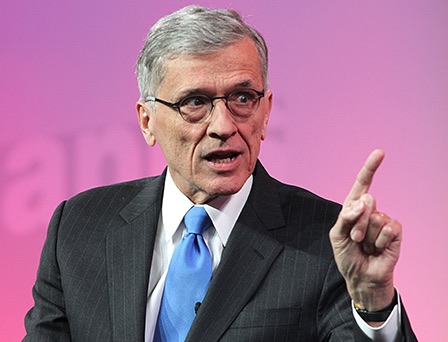Court Backs FCC on Title II

The smarter way to stay on top of broadcasting and cable industry. Sign up below
You are now subscribed
Your newsletter sign-up was successful
The FCC gets to define Internet Service Providers, wired and wireless, as common carriers, and regulate them accordingly. That came courtesy of the majority decision from a three-judge panel of a D.C. federal appeals court.
Most court watchers, even fans of net neutrality rules, were expecting a partial FCC defeat, perhaps with the court having issues with applying Open Internet regulations to interconnections or, for the first time, to mobile broadband.
Nope. Last week’s decision on ISP challenges to the FCC’s 2015 Open Internet Order, though it included a partial dissent from the senior judge, was simply a slam-dunk win, if not the end of the legal trail, for FCC chairman Tom Wheeler, the Obama Administration, buoyant Democrats and gleeful network neutrality advocates.
It also left ISPs scratching their heads, knocking the decision and planning their next legal moves, which some have already said will be appeals to the full court and/or the Supreme Court.
“We have always expected this issue to be decided by the Supreme Court, and we look forward to participating in that appeal,” said AT&T officials almost immediately after the decision. The American Cable Association also signaled it would likely appeal.
The two-judge majority of the U.S. Court of Appeals for the D.C. Circuit rejected all of those ISP arguments against the rules and, therefore, ruled that the FCC had the authority to reclassify those web providers as common carriers under Title II, that it could apply Title II to interconnections and to mobile broadband, and that it had not violated ISPs’ First Amendment rights, or failed to explain why it chose the legal underpinning it did.
The judges also made it clear they were not ruling on whether the FCC had made the right policy choice with Title II, only that it had the authority and had sufficiently justified the decision, so that it was not arbitrary and capricious.
The smarter way to stay on top of broadcasting and cable industry. Sign up below
Now What?
The decision will be appealed first to the full court (en banc) where, if past is prologue, it is unlikely to be reversed. Then it would be off to the Supreme Court.
Assuming the High Court takes that challenge, it could push resolution of the legal issues into at least 2017.
There is no circuit split, but the issue—how the government regulates access to the internet—is clearly of major importance.
Nonprofit think tank Tech Freedom, which intervened on behalf of some of the challengers to the Open Internet order, says if the Supreme Court tally stays at eight justices, any decision would likely be a four-four tie, which would leave the lower court decision in place.
Tech Freedom sees a better chance with the en banc appeal.
Meanwhile, congressional Republicans will likely try to introduce legislation to “clarify” that ISPs are not common carriers; however, that is unlikely to go very far, as analyst Craig Moffett pointed out last week.
“Expect the saber-rattling to begin almost immediately,” said Moffett at the time, correctly reading the tea leaves.
But Moffett doesn’t see anything happening in an election year, particularly given that President Obama would veto any bill that tried to undo the FCC’s rules, given how publicly and strongly he supported Title II. Ask any honest ISPs and they’ll say the president’s preference had a hand in goosing the decision.
Elsewhere, House Republicans have tried to block enforcement until the legal challenges are exhausted, by adding a rider on an appropriations bill. That has little chance as well.
What it means in the near term is that the FCC can continue to push its broadband privacy proposal, which hinged on Title II reclassification.
Also still in play is the FCC’s ongoing investigation into zero rating plans under the net neutrality rules’ general conduct standard. The commission will also get to monitor interconnection agreements and step in if it concludes they are anticompetitive impediments to the virtuous circle of content flowing from the edge to subs.
ISPs had already said they could live with the bright-line rules against blocking and throttling content, or anticompetitive paid prioritization. But they were concerned, and still are, that the general conduct standard gives the FCC too much room to roam into their business models, discouraging innovation and investment.
WHITE HOUSE TAKES VICTORY LAP
President Barack Obama had pushed the FCC to reclassify ISPs as Title II common carriers. So when a federal court upheld the FCC’s decision to do just that, the administration was all over the news. Press secretary Josh Earnest made a statement, and an email was sent to those who signed a We the People petition calling for Title II.
As has FCC chairman Tom Wheeler, the White House signaled it was all about keeping virtual monopolist ISPs from exploiting their control over Internet access.
“Today’s ruling is a victory for the open, fair and free Internet as we know it today—one that remains open to innovation and economic growth, without service providers serving as paid gatekeepers,” said Earnest.
“For most of the Internet’s existence, net neutrality has been the norm, and for most of the president’s term in office, the FCC has implemented rules to enforce it—with no significant burden on Internet Service Providers. Unsurprisingly, today’s ruling affirms those basic realities,” Earnest added.
Contributing editor John Eggerton has been an editor and/or writer on media regulation, legislation and policy for over four decades, including covering the FCC, FTC, Congress, the major media trade associations, and the federal courts. In addition to Multichannel News and Broadcasting + Cable, his work has appeared in Radio World, TV Technology, TV Fax, This Week in Consumer Electronics, Variety and the Encyclopedia Britannica.

